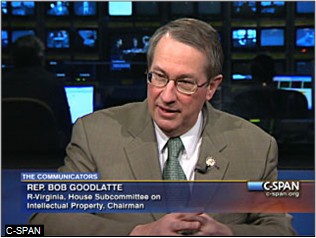House IP Chairman on COICA: “We Don’t Want To Be Egypt.”
WASHINGTON, February 20, 2011 — The lead lawmaker in the U.S. House of Representatives regarding intellectual property issues says that he and his colleagues need to be extremely wary of giving the federal government too much unfettered power when it comes to seizing the domain names of web sites th

WASHINGTON, February 20, 2011 — The lead lawmaker in the U.S. House of Representatives regarding intellectual property issues says that he and his colleagues need to be extremely wary of giving the federal government too much unfettered power when it comes to seizing the domain names of web sites that are suspected of promoting online piracy.
“We don’t want to be Egypt,” Rep. Bob. Goodlatte, R-Va. told C-Span in a recent televised interview that aired Saturday. “Nor do we, when you talk about cybersecurity, a broader issue that goes beyond theft, that goes to the functioning of the internet itself, we don’t want to give government so much power that they have a kill switch, or something like that.”
Goodlatte was responding to a question posed by Gautham Nagesh, The Hill newspaper’s technology and telecom policy reporter.
Nagesh had asked Goodlatte to address the criticisms that S. 3804, the Combating Online Infringement and Counterfeits Act, had engendered when it sped through the Senate Judiciary Committee.
The newly-named chairman of the U.S. House subcommittee with jurisdiction over intellectual property, competition and legal internet issues has been a staunch supporter of enforcing intellectual property laws against infringers on the internet.
But he said during the C-Span interview that federal law enforcers need to play fair.
“Narrowing it down to individual domains, we need to be very careful that we’re doing it in a way where due process is properly followed,” he said.
Thus his committee isn’t going to take the lead from the senate judiciary committee, he added.
“We’re not going to start with what the senate has done — we’re going to start with a careful, fresh look at this,” said the 10-term congressman.
Concern Over Due Process and “Censorship” v. Unfettered Piracy
Numerous groups, including several library associations, public interest groups the Center for Democracy and Technology and Public Knowledge; industry groups the Computer and Communications Industry Association, the Consumer Electronics Association, and NetCoalition have criticized the senate bill, for, among other things, shortchanging targeted web sites on due process.
On the other hand, more than 80 signatories representing the top U.S. brand names across the economy, industry trade groups for music, publishing, and software signed a latter addressed to all members of congress last week supporting the legislation.
Several groups have also argued that the proposed legislation amounts to censorship, but noted First Amendment lawyer Floyd Abrams argued on behalf of five entertainment industry groups earlier this month that “COICA is consistent with the First Amendment.”
“If an order under COICA does result in blocking some non-infringing content, COICA is sufficiently narrow to accomodate the immediate publication of that content elsewhere and the future publication of the content on the same domain,” he argued in a letter addressed to the senate judiciary committee.
Abrams also argued that a web site may be deemed under the proposed legislation to be “dedicated to infringement” based on a set of hyperlinks to another web site rather than for its own hosted content.
This approach is consistent with current case law, he said.
Patent Reform, ICANN’s New Top Level Domain Name Plans, and Obama Administration’s Wireless Initiative Will Also Be Examined
During the wide-ranging interview that was an effective preview of the House subcommittee’s agenda for the 112th congress, Goodlatte said that his committee will also be starting afresh with patent reform, trying to resolve the impasse between independent inventors and corporations that has blocked passage of the legislation for the past six years.
“There’s lots and lots of interest in this, both in Congress, and in various sectors of the economy — not just the tech sector,” he said.
“We’re going to start from scratch, and we’re going to look at where we think there is widespread support, and that could pass the House with strong support,” he added. “But as we do that, we’re going to take into account where the senate is, where the senate has been, and have some close discussions with Senator [Pat] Leahy and Senator [Orrin] Hatch, and other senators to make sure that we’re not creating a divide that can’t be closed.”
Goodlatte also promised a hearing on the Internet Corporation for Assigned Names and Numbers’ (ICANN) controversial plan to expand the number of top level domains.
A top level domain is the part of a web site’s address that comes after the site’s name, such as .com or .net.
ICANN wants to start establishing new top level domains that could include .music and many other kinds of words.
The music industry is concerned that the establishment of new top level domains could encourage and facilitate online copyright and trademark infringement.
During the interview, Goodlatte said that his committee will look at the White House’ recently-unveiled broadband wireless initiative to make sure that the publicly-funded effort is really serving markets that are experiencing market failure.









Member discussion